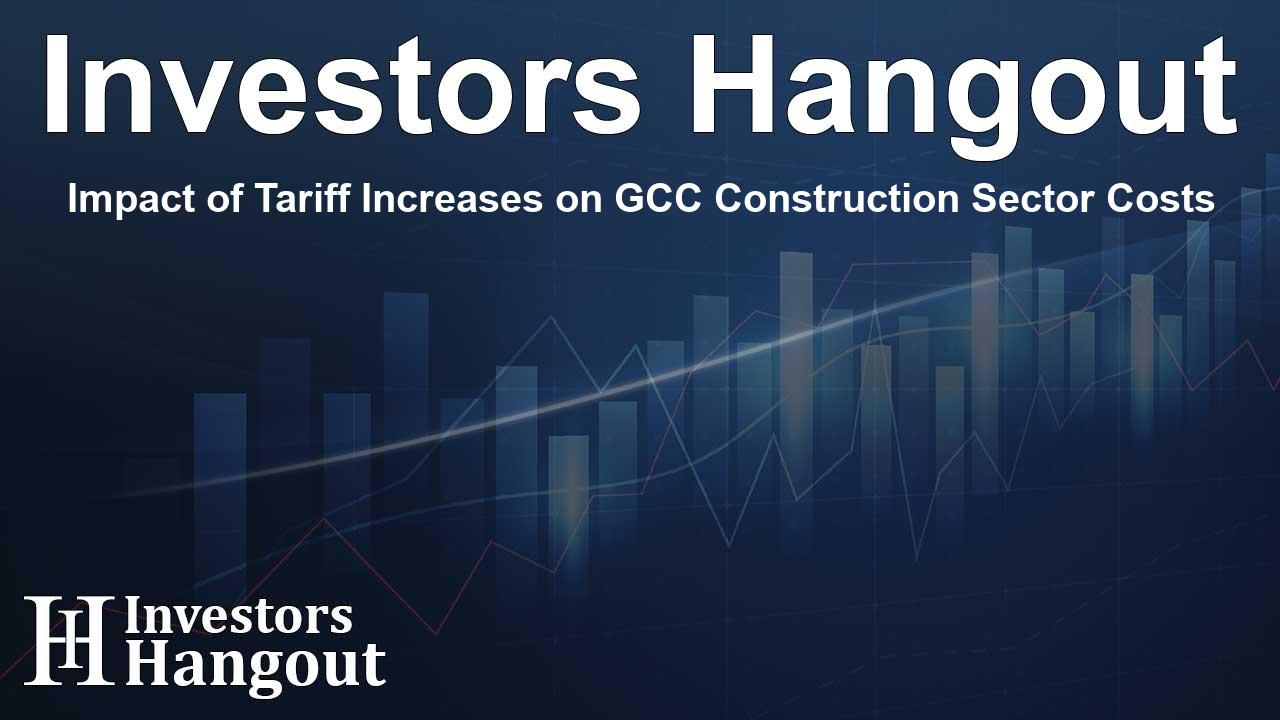Impact of Tariff Increases on GCC Construction Sector Costs

Tariff Increases and Their Impact on Construction Costs
The construction landscape in the Gulf Cooperation Council (GCC) is currently navigating a complex storm of rising costs. Recent trade tariffs announced by global leaders have raised concerns about the future of construction in the region. As outlined in Stonehaven’s latest report, construction costs across the UAE and Saudi Arabia are expected to rise, with predictions indicating increases of 2.7% to 3.3% in the UAE and between 3.4% and 7% in Saudi Arabia. However, these estimates may be conservative due to ongoing market fluctuations.
Current Market Conditions and Their Effects
With over $2.3 trillion in construction projects underway, the GCC heavily relies on international material pricing. Key components such as steel, concrete, and aluminum are facing price hikes, making it critical for stakeholders to reassess their budgets and strategies for ongoing and upcoming projects.
Key Concerns within the Industry
According to industry experts, the recent developments serve as a crucial wake-up call. Gordon Rodger, Managing Director at Stonehaven, highlighted the dire circumstances surrounding labor shortages, outdated construction processes, and external pressures from global tariffs. To buffer against rising costs, developers are urged to take proactive measures to secure their project budgets now, aligning them with feasibility studies to prevent significant impacts on their profits.
Analysis from the Construction Cost Benchmarking Report
The report also delineates key findings regarding different cost inflation rates across the GCC. While the UAE may see costs soar by as much as 5%, the implications for Saudi projects could be even more extensive, pushing costs higher in light of ongoing global trade disruptions. This environment poses considerable risks for builders and developers alike.
Addressing Labor and Technological Challenges
Labor constitutes a huge portion of overall project expenses, accounting for up to 40%. With labor challenges persisting, the implementation of automation and artificial intelligence is becoming paramount. The industry is leaning toward innovative solutions like AI-driven project management and modular construction. These technologies not only mitigate risks but also streamline operations, leading to cost-saving benefits in the long run.
Technological Innovations Reshaping Construction
Emerging technologies such as Building Information Modeling (BIM) are essential tools for managing project costs and risks. Sustainability also plays a pivotal role, with practices such as carbon tracking and green certifications gaining traction as companies strive for eco-friendliness while maintaining profitability.
The Role of Mega Projects in the GCC's Growth
The future of the GCC construction sector is significantly influenced by mega projects that drive market growth. For instance, Dubai is on track to add approximately 19,700 villas by the end of the year, while ambitious projects like NEOM and The Red Sea Project will redefine the Saudi Arabian landscape. Such developments highlight the balance between innovation and the reality of rising costs.
Stonehaven's Vision for the Future
At Stonehaven, the focus is not solely on coping with escalating costs but on leading the industry towards resilience and innovation. The company is incorporating advanced technologies to stay ahead of the curve, ensuring they can tackle the challenges posed by inflation and market volatility. Their commitment to quality and excellence remains unwavering, as they continue to be visionaries in the construction consultancy field.
Frequently Asked Questions
What are the main factors driving up construction costs in the GCC?
Recent trade tariffs and material shortages are primarily responsible for rising construction costs in the GCC.
How much can construction costs increase due to tariffs?
Forecasted increases indicate costs may rise by 2.7-3.3% in the UAE and 3.4-7% in Saudi Arabia.
What role does technology play in modern construction?
Technologies like AI and BIM help manage costs, enhance efficiency, and respond swiftly to market changes.
How important is sustainability to the construction industry?
Sustainability is becoming crucial as companies adopt practices that prioritize environmental responsibility alongside cost-effectiveness.
What is Stonehaven doing to adapt to rising costs?
Stonehaven is implementing AI-driven management and sustainable practices to lead the industry amid cost volatility.
About The Author
Contact Logan Wright privately here. Or send an email with ATTN: Logan Wright as the subject to contact@investorshangout.com.
About Investors Hangout
Investors Hangout is a leading online stock forum for financial discussion and learning, offering a wide range of free tools and resources. It draws in traders of all levels, who exchange market knowledge, investigate trading tactics, and keep an eye on industry developments in real time. Featuring financial articles, stock message boards, quotes, charts, company profiles, and live news updates. Through cooperative learning and a wealth of informational resources, it helps users from novices creating their first portfolios to experts honing their techniques. Join Investors Hangout today: https://investorshangout.com/
The content of this article is based on factual, publicly available information and does not represent legal, financial, or investment advice. Investors Hangout does not offer financial advice, and the author is not a licensed financial advisor. Consult a qualified advisor before making any financial or investment decisions based on this article. This article should not be considered advice to purchase, sell, or hold any securities or other investments. If any of the material provided here is inaccurate, please contact us for corrections.
